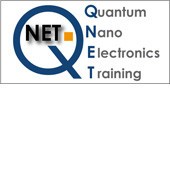Q-NET - Quantum Nano-Electronics Training

Improving our conceptual understanding of quantum electron transport at the nanoscale is needed for enabling the emergence of “Beyond C-MOS“ nanoelectronics devices. This implies a combined effort in the topics of spintronics, molecular electronics, single-electronics, quantum dots, and nanowires, and nanocooling. Rapidly-progressing studies on Quantum Nanoelectronics rely on state-of-the-art technologies of nanofabrication, electron and near-field microscopies, transport measurement under extreme conditions (low temperatures, magnetic field, radio-frequency irradiation) and theoretical calculations.
Quantum Nanoelectronics provides a challenging and innovative framework for training young researchers with excellent prospects for a career either in industry or in academia. At present, an estimate of 1 000 researchers is active in the field and about 150 PhD students are graduating every year. This number of PhDs needs to be increased in order to meet industrial needs in terms of highly skilled scientific staff in the micro and nanoelectronics industry. There is also a strong demand for such trained researchers from the industries of instrumentation, metrology, gas handling, telecommunication, and space.
Q-NET’s general objective is to increase the training level of the European researchers in the field of Quantum Nanoelectronics. In order to reach that objective, Q-NET will recruit and train young researchers at the highest level in an all-inclusive way. The recruited 14 PhD students and 2 post-docs will receive training on a wide set of carefully identified expertises at a level that will be defined within a personal career development plan. Q-NET training will include scientific and technological expertise in the general field of Quantum Nanoelectronics and a full set of complementary expertises. The complementary training program will aim at equipping Q-NET trainees with entrepreneurial mindsets, thus enhancing their employability in both industry and academics.
- Make new S&T advances in the Quantum Nanoelectronics field. Q-NET will contribute to a deeper conceptual understanding of quantum devices based on individual nanoobjects and phase-coherent phenomena. New concepts, new materials, and new approaches will be developed, investigated, and applied. Q-NET aims at both improving the specifications and performances of existing devices concepts and developing new kinds of nanostructures with exciting new features.
- Provide world-class S&T training sessions in nanoscience and nanotechnology. Q-NET will organize four sessions of the European School On nanoscience and nanotechnology (ESONN) devoted to Quantum Nanoelectronics, combining both theoretical and practical training, and will open them to young researchers outside the consortium.
These objectives will be reached through a comprehensive set of collaboration schemes between the consortium’s partners, with carefully defined research objectives. Systematic secondments of recruited researchers from one partner to several others will be organized, including for every researcher a secondment of at least two months to a private-sector partner. This placement scheme carries the double objective of training the seconded researchers and of fostering the S&T objectives achievement.
A Supervisory Board will closely endorse the Q-NET training with a strong involvement from two private sector partners, who will also contribute to the training by lecturing at complementary Special Training Sessions.
CIC nanoGUNE - Spain (Coordinator)
Swiss Federal Institute of Technology in Zürich (ETH) - Switzerland
Aalto University - Finland
Consiglio Nazionale delle Ricerche - Italy
Universite Joseph Fourier Grenoble 1 - France
University of Leeds - United Kingdom
